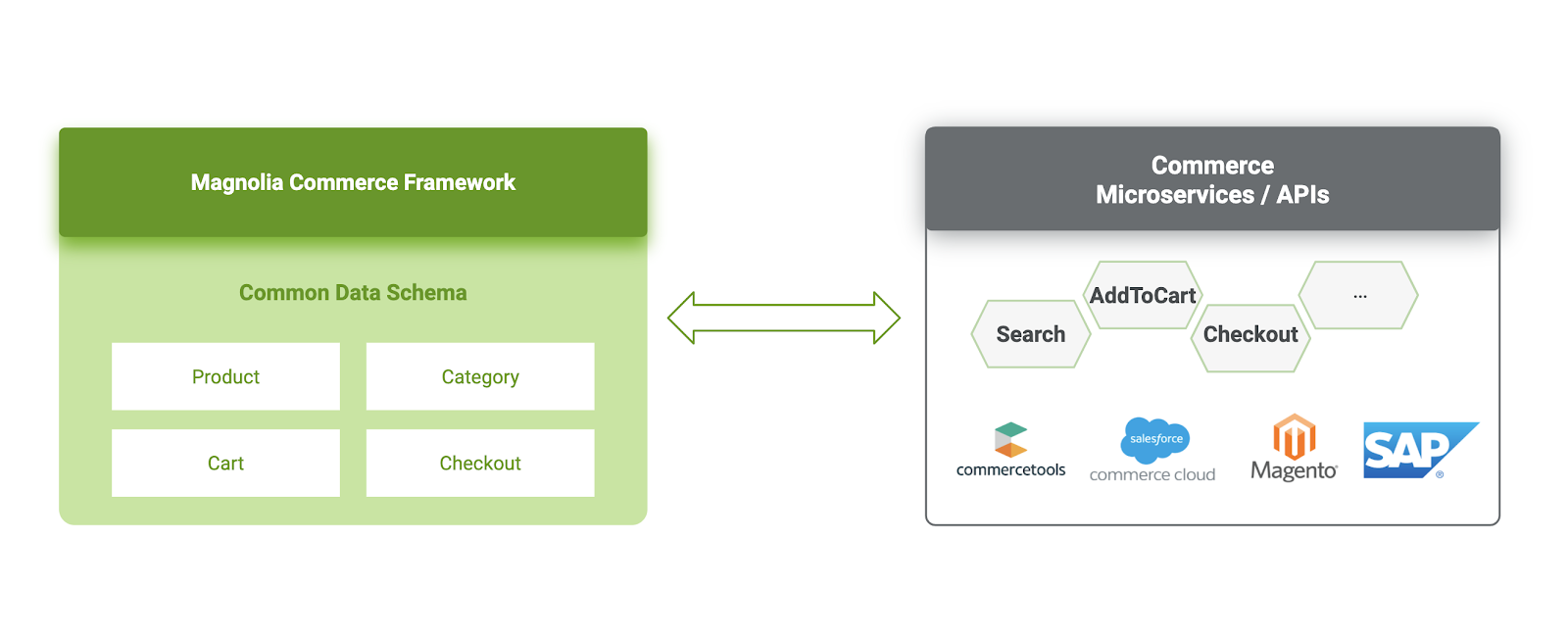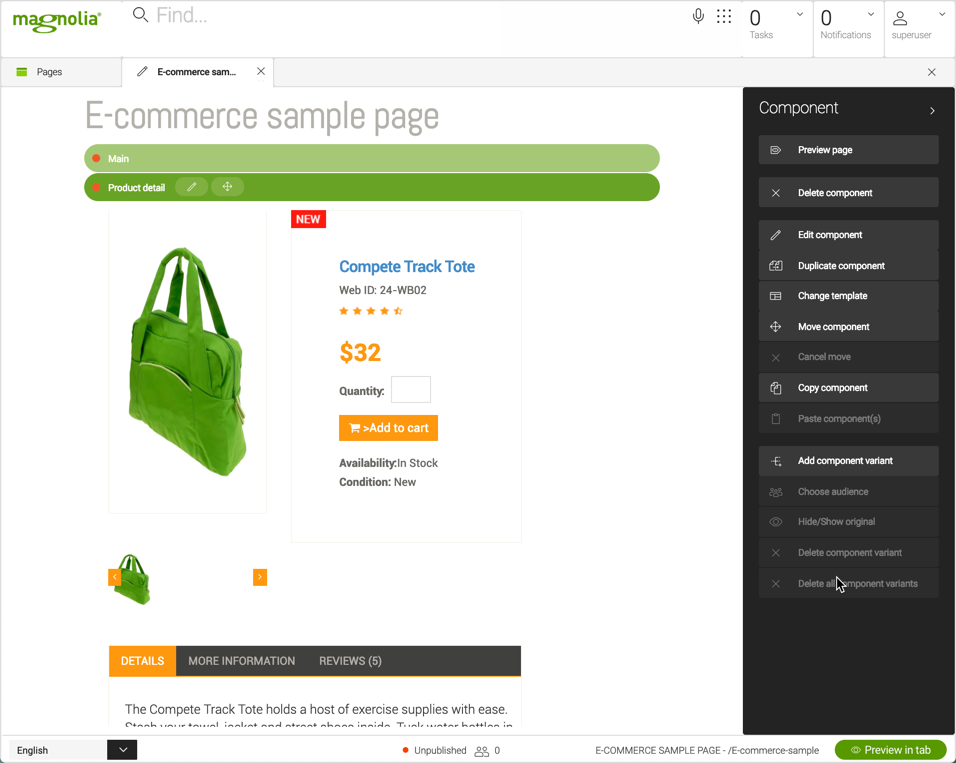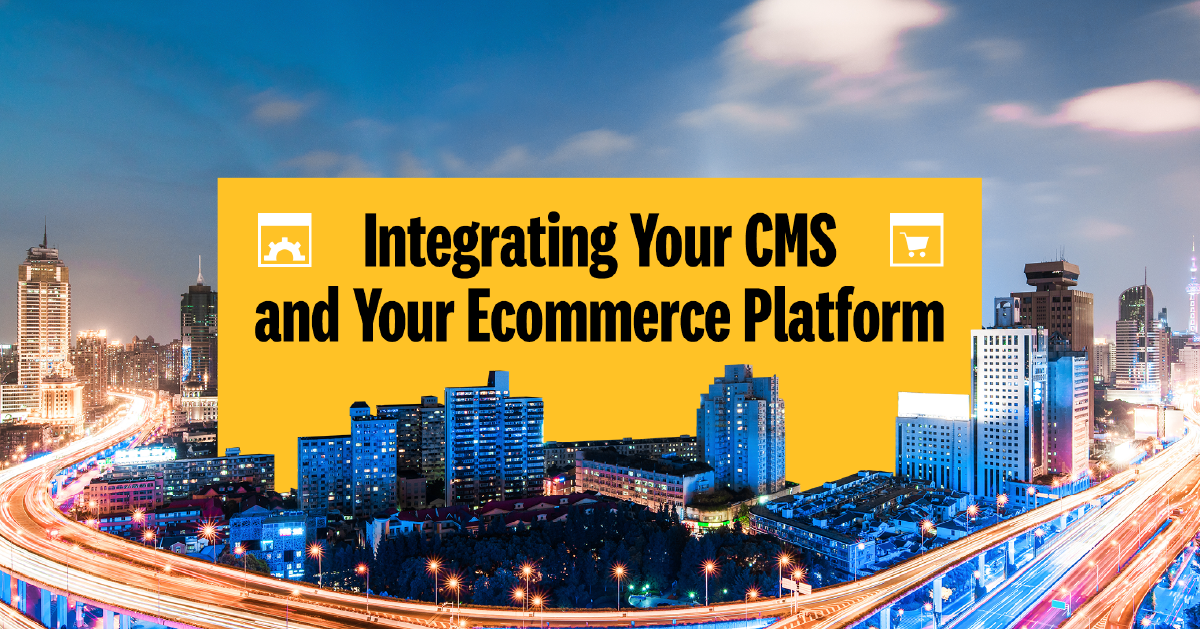- Nov 11, 2021
- --
Integrating Your CMS and Your Ecommerce Platform
Discover how connections with ecommerce systems can help you get the most out of your online brands.
Experience Magnolia in action
Experience Magnolia's key features firsthand in an interactive product tour.
Take a tour nowBuilding a modern technology stack today isn’t a one-size-fits-all affair. Every brand has different customers, approaches, and requirements for the technology they have at their disposal. Marketing tech stacks especially can be complicated due to the wealth of options available.
The first place to start is with the CMS, the heart of your marketing tech stack. Traditional platforms are no longer enough due to their limitations in today’s dynamic content world. A hybrid headless system helps you to get the most out of an ever-increasing number of channels and varying types of content, but brands need to focus on a best-of-breed approach and the power of not just a CMS, but a digital experience platform (DXP).
A modern DXP can not only store and manage your content but also connect through multiple extensions to further enhance its capabilities. That’s why at Magnolia we don’t just offer a hybrid-headless CMS, but also a best-of-breed philosophy and Connector Packs that extend the DX platform to your other core digital systems, including Marketing Automation, Analytics, Digital Asset Management and Commerce (Magnolia Marketplace).
What Is An Ecommerce CMS?
The growth of omnichannel, where consumers connect with brands through every device they can, means that Ecommerce is now a requirement and no longer a luxury.
Technology has also adapted to further improve the online purchasing process with the help of augmented reality (AR) to enhance the shopping experience and voice search capabilities to make it easier to find things on the go.
Brands that hope to keep pace with the rest of the world need to adopt an ecommerce strategy and fast. The best place to start is by targeting the technology stack currently in use, and the answers lie in how commerce connects with content. This also applies to B2B companies looking for a CMS for ecommerce.
An ecommerce CMS helps manage the content for an ecommerce site. This includes product descriptions, page layouts, promotions, and campaigns. It also helps to optimize content for various channels.
Thinking of commerce as a content initiative is important since content influences how much trust buyers place in a brand and how they make their buying decisions. Enterprises aren’t immune to this need. As B2B buyers use more and more digital channels (up to 10) for product research and purchases, organizations need to switch to a B2B ecommerce CMS to develop a digital content system and offer the personalized customer journey the buyers expect.
Web content is stored, managed, and distributed with the help of a CMS or DXP to a brand website and other channels such as smart speakers, mobile phones, or other devices thanks to headless capabilities. Just as the CMS has evolved to become headless, it has spawned a new wave of commerce options to match this changing world, namely headless commerce.
With a headless commerce solution and an ecommerce CMS, the ecommerce and content management backend is decoupled from the front-end presentation layer. Using a CMS, brands can manage the backend - creating, editing, and publishing content - while the content then gets displayed on a website, a mobile device, or on another IoT-enabled device.
Headless commerce allows for the smooth integration of other channels that have yet to see widespread use or be created at all. For instance, customers will eventually gain the ability to order food using the devices in their kitchen and have an assortment of brands to choose from.
As companies consider ways in which users will make purchases now and in the future, an ecommerce headless CMS can have a tremendous impact on the user experience. Buyers today are not just looking for convenience when they decide to purchase; they’re also looking for personalization. Even in sectors where companies rely on other businesses as clients, personalization still matters, meaning that organizations need to consider the impact of their B2B ecommerce CMS.
Brands that leverage personalization as part of their ecommerce offerings are likely to reap the benefits of increased conversions and lower cart abandonment rates. To do this effectively, they will need to count on a best-of-breed DXP that is built for dynamic digital experiences.
Read more about: What is ecommerce personalization?
Magnolia Commerce Connector Pack
With the Commerce Connector Pack from Magnolia, you can finally transform your ecommerce experience for both your team and your customers.

With the Commerce Connector Pack from Magnolia, you can finally transform your ecommerce experience for both your team and your customers.
Ecommerce platforms don’t typically give marketers or non-technical users the necessary tools to edit and customize content in the way they would like.
Often missing are the options for greater segment targeting, content repurposing for more than just a website, and templates to make everything easier to work with. To extend ecommerce software with further tools to boost functionality usually results in a costly and time-consuming process. Instead, your company needs an easy way to connect your CMS and ecommerce platform.
Magnolia places the power back in the hands of marketers, providing the tools for content creators to do the editing and customization they need with ease while maintaining the functionality of shopping carts and other ecommerce necessities.
The Commerce Connector Pack and accompanying connectors provide a way for businesses to combine content and commerce to tremendous effect, by connecting your CMS and ecommerce platform.
Reduce Costs
Integrating an ecommerce platform and CMS can be an expensive and drawn-out process when there is a lot of custom code to deal with.
With a commerce cloud CMS like Magnolia, backend developers can benefit from faster integration times thanks to several connectors for platforms like Salesforce Commerce Cloud, SAP Commerce, Adobe Commerce, and commercetools. To connect other ecommerce systems, only a small amount of Java code is required.
Front-end developers can benefit from Magnolia’s APIs, which include templating for easier access to products from external ecommerce sources.
Unify Experiences
Magnolia provides a bridge between the virtual shopping cart on your website and your ecommerce solution backend.
Thanks to the power of REST APIs, Magnolia can communicate with the ecommerce platform and unify the digital experience, allowing the customer to go through the entire checkout process and receive updates without going to another shopping cart.
Overcome Limitations
Content creators no longer have to worry about not being able to find products or go through a lengthy process browsing a product catalog. With the Commerce Connector Pack, marketers can find everything they need easily and then produce compelling content related to your brand and products.
With everything connected in one place, they can also draw on what they need to make data-driven decisions and deliver the right content to the right customer at the right time.
Commerce Connector Pack product brief
Overcome the CMS limitations of your e-commerce system and accelerate integration with Magnolia's Commerce Connector Pack.
Download nowHow Does the Commerce Connector Pack Work?
Let’s take an example. You may have a large grocery retail web presence. Your product department manages the master data for all 30k product SKUs from 200+ suppliers in a mammoth legacy product catalog, which also stores different prices for several countries. You manage the experience in Magnolia: you create an intuitive set of top-level pages for each of your departments such as bakery, meat, drinks, pets, etc.
Magnolia breaks the content-commerce silo by giving a single access point to your digital teams. With Magnolia, they can:
Curate which product SKUs should be featured by creating a link directly to the products in your product catalog.
Filter on products and categories
- and automatically create matching experiences such as landing pages with products that match your filter.
Enrich product content with marketing copy directly in the CMS.
Magnolia’s commerce integration framework, which sits at the foundation of our Commerce Connector Pack, makes all of this possible by providing:
Integrations to Leading Ecommerce Systems

Magnolia gives you the freedom to choose the ecommerce solution that works best for your business and has made it smooth and straightforward to integrate. The commerce integration framework comes with connectors to the following third-party solutions:
SAP Commerce Cloud (formerly Hybris)
Adobe Commerce (formerly Magento)
The REST API allows you to get data on products and categories from these third party systems, making it suitable for headless implementations.
Intuitive Workflows and Unified User Experience Across Integrations

The commerce integration framework does not just accelerate development, it also takes integrations to the realm of the authoring UI.
Content creators can easily retrieve the information they need from external ecommerce solutions, and work with ecommerce content as if it were native Magnolia content.
They can find products in the Find Bar, browse the product catalog, and view product details within Magnolia. Catalogs, categories, and their products are all searchable in Magnolia.
They can further place products into pages or components using templating, just like any other reusable piece of content, and produce compelling, story-driven shopping experiences.
Combine Content and Commerce with Magnolia
Magnolia provides a best-of-breed DXP for creating digital experiences that entice and engage your customers. With the Commerce Connector Pack, the burden on developers and marketers is reduced, allowing them to work together to create the right experiences for the customer journey.









